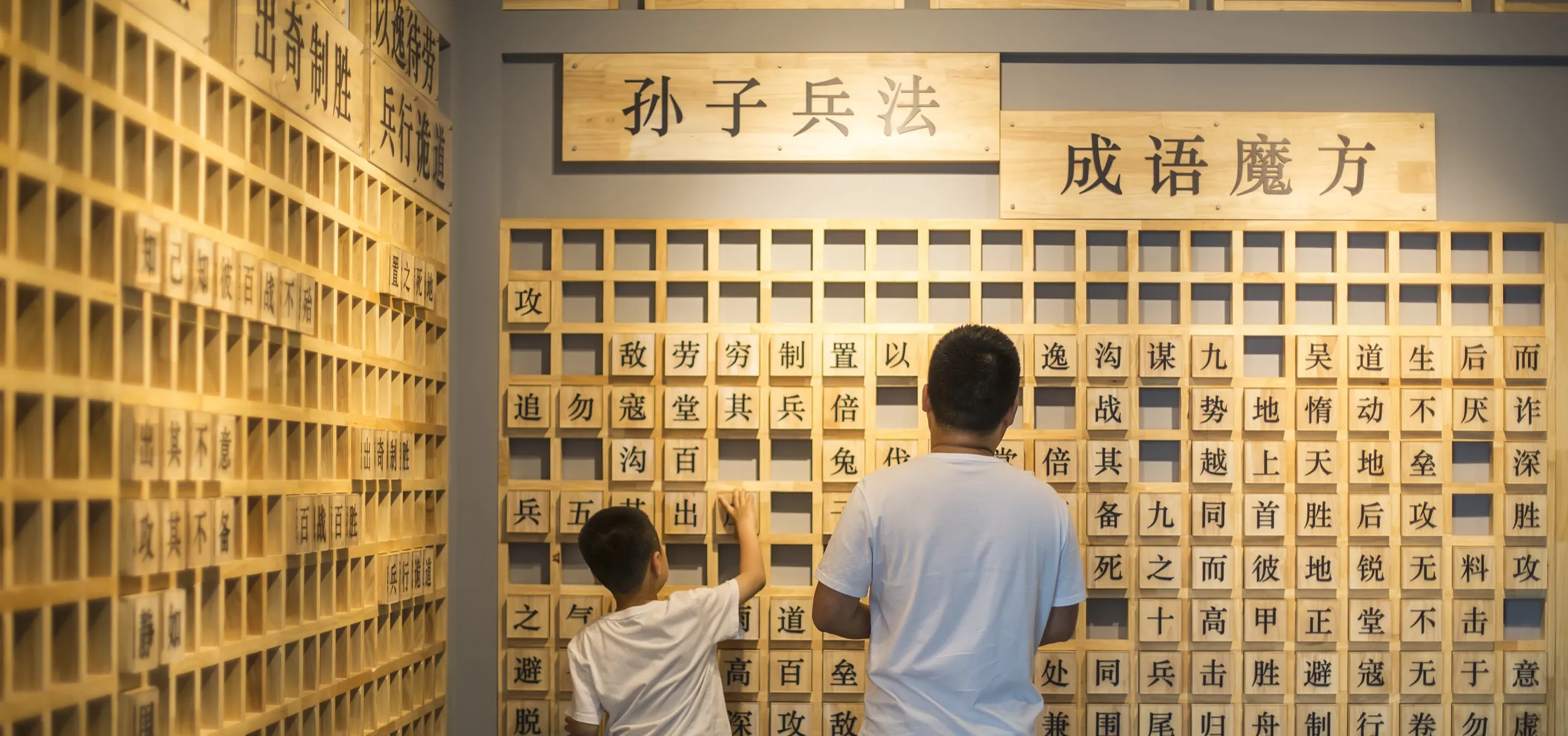The Chinese ‘chengyu’ that aren’t four characters long
Long-time followers of TWOC’s Choice Chengyu column will know that nearly all Chinese chengyu (成语), or idiomatic expressions, are made up of four characters. Indeed, in The Commercial Press’s latest Dictionary of Chinese Idioms (《汉语成语小词典》) , 2,891 out of the 3,031 listed chengyu consist of four characters. Four characters gives sayings symmetry, rhythm, and balance, with the first-century BCE Classic of Poetry (《诗经》), the earliest existing anthology of poems in China, nearly completely made up of four-character phrases.
But there are, in fact, chengyu that are not four characters long. There are three-character varieties, and the longest is 16 characters long: 不是东风压了西风,就是西风压了东风 (Búshì dōngfēng yāle xīfēng, jiùshì xīfēng yāle dōngfēng, when two sides compete there can only be one winner). Three-character varieties include “应声虫 (yìngshēngchóng, ‘yes man’)” and “和稀泥 (huò xīní, try to smooth things over),” while a six-character example is “五十步笑百步 (wǔshí bù xiào bǎi bù, the pot calls the kettle black).” Here TWOC introduces some more chengyu that are not the standard four characters in length.
醉翁之意不在酒 Zuìwēng zhī yì bú zài jiǔ
A drinker’s delight does not reside in the wine
This idiom first appeared in Account from the Old Drunkard’s Pavilion (《醉翁亭记》), written in 1045, when the poet Ouyang Xiu (欧阳修) wrote: “My delight does not stem from the wine but from the scenery of the mountains and rivers (醉翁之意不在酒,在乎山水之间也 Zuìwēng zhī yì bù zài jiǔ, zàihū shānshuǐ zhī jiān yě).” The chengyu was later used to indicate those who are distracted or who harbor ulterior motives, and now has negative connotations.
Coming to walk in the park is not his real purpose, he has actually come to meet someone.
Tā guòlái cānjiā yóuyuán shì zuìwēng zhī yì bú zài jiǔ, zhǐshì xiǎng jièjī dāshàn.
他过来参加游园是醉翁之意不在酒,只是想借机搭讪。
打秋风 dǎ qiūfēng
Whip the autumn wind
This idiom refers to those who tactically use wealthy friends, family, or even acquaintances, only to take advantage of their hospitality—they hope for a good meal, or ask for money and favors. In other words, they sponge off others. The chengyu became famous for a scene in the classic Ming dynasty (1368 – 1644) novel Dream of the Red Chamber (《红楼梦》) when Granny Liu, a distant relative of Lady Wang of the prestigious Rongguo household, is mocked by servants of the household for her rural and unrefined family background. The servants claim Granny is taking money from the family, or “打秋风.” The phrase can also be written “打秋丰,” or “whip the autumn harvest.”
Here he is again, I’m afraid that he may have come just to take our money again.
Tā yòu lái le, pà búshì yòu lái dǎ qiūfēng de ba.
他又来了,怕不是又来打秋风的吧。
耳报神 ěrbàoshén
Ear-telling god
In the same novel, Wang Xifeng, Lady Wang’s niece, decides to lock up some insolent elderly servants and expel them from the mansion. She does so without first informing their employer, Lady Xing. But Lady Xing somehow receives word of Wang’s decision, and quickly turns up to ensure the old nannies are released. Shocked, Wang asked, “Which ear-telling god relayed you the message so quickly?” Since then, this idiom has referred to informers who reveal secret messages, and is not a positive label to have.
He has informers everywhere. You must be careful when you speak.
Biàndì dōushì tā de ěrbàoshén, nǐ kě yào xiǎoxīn shuōhuà.
遍地都是他的耳报神,你可要小心说话。
五十步笑百步 Wǔshí bù xiào bǎi bù
Retreat 50 steps and laugh at those who retreated 100 steps
This phrase is similar to the English idiom “the pot calls the kettle black.” During the Warring States period (475 – 221 BCE), the King of Wei was notorious for his military campaigns against other kingdoms, but also spent much of his time saving his people from famine by moving them to areas with food available. Yet no matter how much he tried to help his people avoid hunger, the population of the state of Wei simply didn’t increase.
The king called on the great philosopher Mencius (孟子), who lived during the third and fourth centuries BCE, for help. Mencius replied by telling a story of two groups of retreating soldiers: One group retreated 100 paces, while another retreated 50, and then stopped to laugh at the group who ran further away. Mencius meant to point out to the king that so long as he kept going to war, using all the food for his soldiers, and ignoring the effects of warfare on his population, the common people would suffer.
They were both late and yet he still mocks the person who was later than him! That really is the pot calling the kettle black.
Tóngyàng shì chídào, hái cháoxiào bǐ zìjǐ hái wǎndào de rén, jiǎnzhí shì wǔshí bù xiào bǎi bù!
同样是迟到,还嘲笑比自己还晚到的人,简直是五十步笑百步!
敲边鼓 qiāo biāngǔ
Beat a nearby drum
This idiom first appeared in the Observations on the Current State of Officialdom (《官场现形记》) , a novel by Li Baojia (李宝嘉) from the Qing dynasty (1616 – 1911). In the book, Wang Mushan, an owner of a bookstore, racks up huge debts through extravagant spending and tries to enlist his friend Cai Zhi’an to help him convince Shen Yifu, a rich philanthropist, to lend Wang 5,000 taels of silver. But Shen had already refused to lend to Wang because of his extravagance. Cai, therefore, ultimately declines to approach Shen, saying to Wang: “You need to speak to Shen yourself. All I can do is be nearby beating a drum.” Since then, the idiom has been used to indicate those trying to support others in an argument, though nowadays it is sometimes used in a negative way to refer to someone who always butts into others’ conversations:
He always chimes in when somebody else is talking. It’s really annoying.
Rénjiā shuōhuà de shíhou, tā zǒngshì xǐhuan qiāo biāngǔ, zhēn fán.
人家说话的时候,他总是喜欢敲边鼓,真烦。
鸿门宴 hóngményàn
Hongmen Banquet
This chengyu comes from an almost deadly banquet in the Han dynasty (206 BCE — 220 CE). According to the Records of the Grand Historian (《史记》), in 206 BCE, Xiang Yu (项羽), a rebel leader, devised a plan to invite his rival Liu Bang (刘邦), who later founded and became emperor of the Han dynasty, to a banquet at the Hongmen fortress in order to kill him. But Liu saw through Xiang’s ruse and managed to escape before getting caught. The idiom has since come to indicate any attempt to trap a guest in an unwanted situation. When someone you dislike or have had little contact with invites you out for dinner, you might ask: “Could this be a Hongmen Banquet?”
A friend of mine who hadn’t been in touch for a long time suddenly invited me to a dinner. Could it be a Hongmen Banquet?
Hǎojiǔ méi liánxì de péngyou tūrán shuō yào qǐng wǒ chīfàn, bù zhīdào shì bú shì yì chǎng hóngményàn ne.
好久没联系的朋友突然说要请我吃饭,不知道是不是一场鸿门宴呢。












